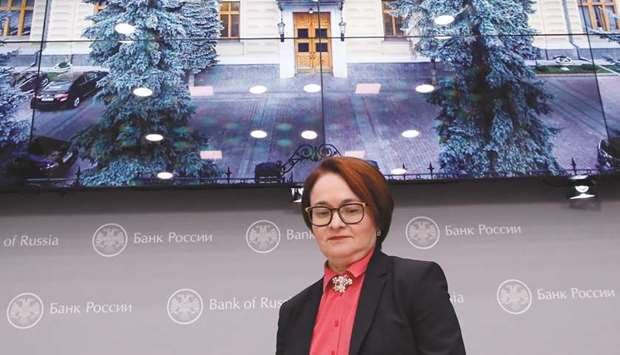The Russian central bank kept interest rates unchanged yesterday but said it could lower the key rate later this year if inflation eases in line with expectations and no major shocks occur in the oil market.
The central bank held its key rate at 7.75%, as analysts in a Reuters poll had anticipated, predicting that the current inflation pattern did not require another rate hike after the bank raised rates twice in 2018.
Central Bank governor Elvira Nabiullina, presenting the rate decision, said the two rate hikes the bank made last year were sufficient to slow inflation towards the 4% target as soon as next year.
“Should the situation unfold according to our baseline forecast, we hold open the prospect of a key rate reduction somewhat sooner than we assumed back in December last year,” Nabiullina said.
“We do not rule out that this may occur in 2019,” she said, adding it was too early to provide a more specific timeframe for a possible cut.
While the central bank said inflationary expectations were still elevated, it has lowered its inflation forecast for 2019.
Inflation, the central bank’s main remit, is set to peak at around 5.5% in March or April before slowing to 4.7-5.2% by the end of the year.
Inflation was lower than expected because the impact of a value-added tax (VAT) increase has proven to be moderate, the central bank said.
Analysts said it was too early to price in a lower cost of lending even though the central bank has visibly softened its monetary policy stance by mentioning possible rate cuts.
“We believe the actual list of upside risks to CPI is longer than those listed by the CBR, making a rate cut before the fourth quarter highly unlikely,” ING Bank said in a note.
The central bank’s policy will heavily depend on external conditions and the possibility of more Western sanctions against Moscow is seen as the main game-changer, experts said. “The imposition of (new) sanctions will force the central bank to changes plans cardinally,” said Stanislav Murashov, an economist at Raiffeisen Bank in Moscow.
The rouble fell more than 1% on the day to 64.61 versus the dollar after the rate decision but analysts linked it to a drop in oil prices and players’ intention to lock in profits ahead of the weekend.
Business / Business
Russia central bank holds key interest rate at 7.75%, says cuts possible in 2019

Russian central bank governor Elvira Nabiullina attends a news conference in Moscow. The Bank of Russia kept interest rates unchanged yesterday but said it could lower the key rate later this year if inflation eases in line with expectations and no major shocks occur in the oil market.
